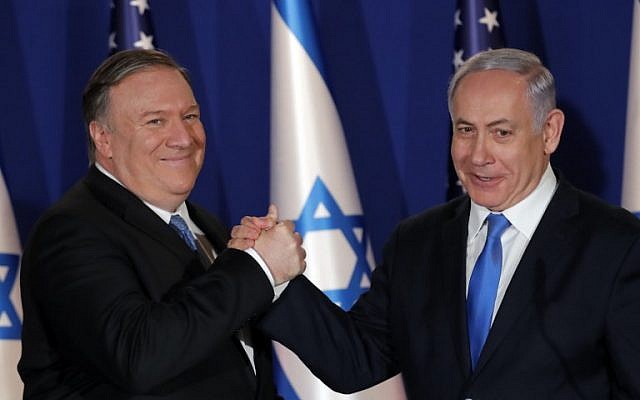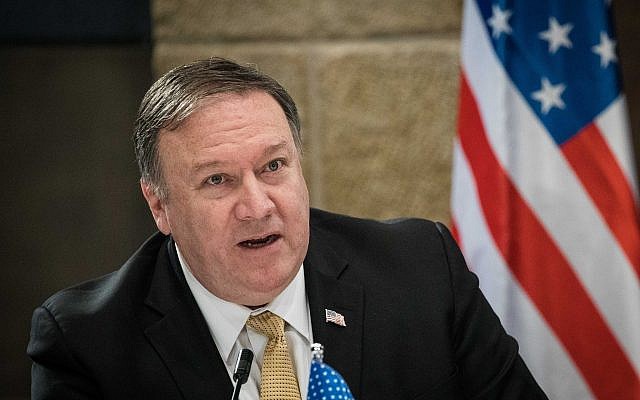US secretary of state tells CNN ‘The vision that we’ll lay out is going to represent a significant change from the model that’s been used’
By TOI STAFF
US Secretary of State Michael Pompeo during a press conference with Prime Minister Benjamin Netanyahu in Jerusalem, March 20, 2019. (Noam Revkin Fenton/Flash90)
US Secretary of State Mike Pompeo on Friday said he did not believe Prime Minister Benjamin Netanyahu’s talk of extending Israeli sovereignty to West Bank settlements would hurt the Trump administration’s long-gestating peace plan.
His comments would appear to indicate that the US plan does not provide for Palestinian statehood, or even for Palestinian control of substantive contiguous territory in the West Bank.
Asked during a CNN interview by anchor Jake Tapper whether he thought Netanyahu “vowing to annex the West Bank” could hurt the US proposal, Pompeo answered “I don’t.”
“I think that the vision that we’ll lay out is going to represent a significant change from the model that’s been used,” he added.
“We’ve had a lot of ideas for 40 years. They did not deliver peace between the Israelis and the Palestinians,” he said. “Our idea is to put forward a vision that has ideas that are new, that are different, that are unique, that tries to reframe and reshape what’s been an intractable problem.”
He said the Trump administration wanted “a better life” for both Israelis and Palestinians.
In interviews days before the elections, Netanyahu said he intended to gradually apply Israeli law to all settlements, and that he hoped he could do so with the agreement of the United States.
Flatly ruling out Palestinian statehood, which he said would “endanger our existence,” Netanyahu promised to permanently maintain overall Israeli security control in the West Bank and to formalize Israeli rule over the 400,000-plus Israeli Jews in the settlements. This would apply not only to major settlement blocs, but also to isolated settlements, he indicated.

Netanyahu has also said he told US President Donald Trump he would not evacuate “a single person” from any of the settlements, amid reports that he believes Trump will back him on settlement sovereignty if the Palestinians reject the much-anticipated Trump peace plan.
Several mainstream US Jewish groups, including the Reform and Conservative movements, have implored Trump to restrain Netanyahu, saying in a letter released Friday that the sovereignty move “will lead to greater conflict between Israelis and Palestinians, severely undermine, if not entirely eradicate, the successful security coordination between the State of Israel and the Palestinian Authority, and galvanize efforts such as the Boycott, Divestment and Sanctions movement that are intended to isolate and delegitimize Israel.”
The White House has said it would release its peace proposal following the elections in Israel, which took place last week.
The Palestinian Authority has boycotted the Trump administration since its recognition in December, 2017, of Jerusalem as the Israeli capital, and has vowed to oppose the deal. The US administration has cut more than $500 million in Palestinian aid since the start of the Palestinian boycott. The Palestinians claim East Jerusalem as the capital of their future state. International consensus has been that Jerusalem’s status must be negotiated between the two sides.




Any efforts to create a new Country should be for the deserving Pro West Kurds using land from Syria, Turkey, or Iraq. The Arabic people residing in Israel Territories have 24 Arabic Countries to choose from. BTW wasn’t Jordan supposed to be for the Arabs of the area. There is of course no Palestine.